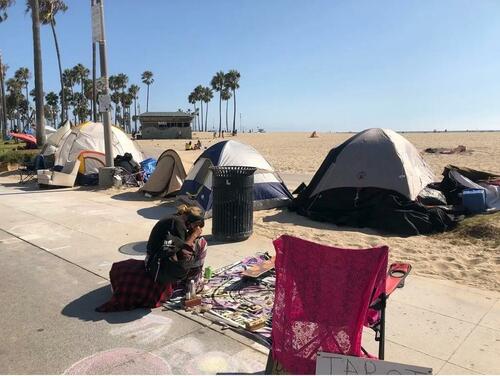Over 100,000 LA Residents Could Be Homeless By 2028 Olympics
With the Paris 2024 Olympics having come to a close, the countdown has started once more for the next Summer Games, set to take place in Los Angeles, the United States in four years time. Despite this year’s Olympiad having been heavily criticized for the “social cleansing” that took place in the run up to the event, with thousands of people relocated from the city’s encampments and squats, Statista’s Anna Fleck reports that there are already questions over how LA will respond to its homelessness crisis.
A 2023 report by McKinsey & Company reveals that LA’s number of people experiencing homelessness is the highest of any city in the United States.
According to the source, approximately one in every 150 LA inhabitants, or 69,000 people, are experiencing homelessness, and figures are still growing.
As Fleck shows in the following chart, based on estimates from the Los Angeles Homeless Services Authority, where 84,000 people are estimated to experience homelessness in 2024, the figure could rise above the 100,000 mark by 2028. This data is based on the calculation that for every 207 individuals who exit homelessness daily, 227 more enter it.
You will find more infographics at Statista
Such crises affect all people in a society. For those experiencing homelessness directly, the impacts are of course the most severe, as according to the report, women who experience chronic homelessness can expect to see their lives cut short by an average of 35 years, while it is 28 years for men. For people living in the wider society, ripple effects are felt too as populations experiencing chronic homelessness have “historically required more spending on support services than the rest of the population”.
Increasing the stock of affordable housing is one part of the solution put forward by the McKinsey & Company analysts to at least slow the growth in homelessness, placing fewer people at risk of entering the situation in the first place. Just some of the barriers to this so far have been the complexity of the approval process as well as the high costs of construction.
The report states that a multi-pronged solution is needed to respond to this crisis of inequality, however, explaining: “building more housing is not enough on its own. Given the scale and complexity of the crisis, any solution may need tailored, large-scale coordination, the likes of which are typically seen in national-scale emergencies.”
This includes recognising that different groups have different specific needs, for example, whether that’s providing support for survivors of domestic violence, or for those battling with substance use disorders or for the formerly incarcerated.
These figures are estimates and vary depending on the source. For example, NBC reports the figure could be closer to 30,000 people.
Tyler Durden
Thu, 08/15/2024 – 16:40

